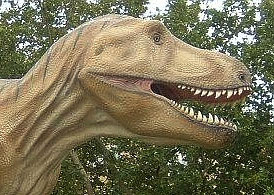Dinosaurs survived rapid climate change
Dinosaurs survived rapid climate change
mongabay.com
September 23, 2006
New research suggests the existence of periods of dramatic climate change during the Mesozoic Era, a time when dinosaurs ruled the Earth.
|
|
The research, published in the September issue of Geology, presents evidence that ocean surface temperatures varied as much as 6 degrees Celsius (about 11 degrees Fahrenheit) during the Aptian Epoch of the Cretaceous Period 120 million years ago according to scientists from Indiana University Bloomington and the Royal Netherlands Institute for Sea Research who examined ancient rocks from the bottom of the Pacific Ocean. The results challenge the idea that the period was characterized by a stabl, hot and humid climate.
The researchers say the research is significant because it presents a case where “temperatures shifted erratically due to changes in carbon cycling and did so without human input” according to a news release from Indiana University.
“Combined with data from the Atlantic, it appears clear that climate changes were taking place on a global scale during this time period,” said Indiana University geologist Simon Brassell, who led the study. “The data we collected suggest significant global fluctuations in temperature.”
Brassell says the findings are relevant to today’s climate change debate.
“One of the key challenges for us is trying to predict climate change,” Brassell said. “If there are big, inherent fluctuations in the system, as paleoclimate studies are showing, it could make determining Earth’s climatic future even harder than it is. We’re learning our climate, throughout time, has been a wild beast.”
Related articles
Massive climate change rocked ecosystems, animals 55 million years ago. Continued increases in greenhouse gas concentrations in the atmosphere from the combustion of fossil fuels could trigger large-scale changes in global biodiversity and require thousands of years of recovery according to recent research on an extreme global warming episode 55 million years ago.
Climate change caused major disruption to past ocean currents. Massive climate change 55 million years ago caused major disruption to ocean currents according to new research by scientists at Scripps Institution of Oceanography at the University of California, San Diego. A rapid rise in global temperatures during the Palaeocene-Eocene Thermal Maximum (PETM) triggered many global shifts, including a reversal of ocean currents and large-scale changes in global biodiversity. Scientists are concerned that similar changes could result from modern-day global warming. Already, there is growing evidence to suggest a slow-down in North Atlantic currents that help keep Europe relatively warm.
Climate change brought tropical forest to Wyoming. Climate change 55 million years ago caused significant changes in forest composition and the distribution of mammals according to a new study in Science. The Paleocene-Eocene Thermal Maximum, in which temperatures rose by as much as 10 degrees in a relatively short period of time, helped bolster the “Age of Mammals,” which included the first appearance of modern primates. After an initial period of increasing aridity in northern latitudes like the study site of Bighorn Basin in northwestern Wyoming, it appears that forests transitioned towards warm tropical ecosystems with closely spaced trees, ideal for the evolution of primates.
This is article uses quotes and information from a news release from Indiana University.
